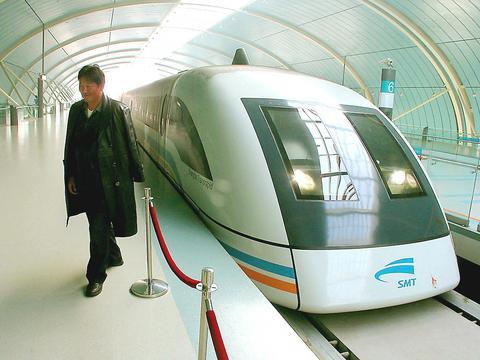Sleek, silvery and ready to fly, Shanghai's 430kph magnetic-levitation train began its daily commercial operation yesterdayday, shooting out of its station amid high hopes for better -- and much more expensive -- commuting.
The opening came a year and a day after German Chancellor Gerhard Schroeder visited Shanghai for the maiden voyage of the German-built project.

PHOTO: AP
The first train yesterday pulled out at 8:32am from Longyang Station with 10 passengers aboard for the 7-minute, 20-second whoosh of a journey -- 30 kilometers to Pudong International Airport.
The price of an economy seat is 75 yuan (about US$9), and VIP seats cost 150 yuan (about US$18). Trains will run every 20 minutes daily.
Security guards stood by at the entrance. Passengers were required to go through airport-style security to board. Digital signs monitored the speed for passengers.
Based on German technology, the US$1.2-billion train connects Shanghai to its 3-year-old airport, the city's second.
The system underwent nearly a year of testing since it made an inaugural experimental run on Dec. 31, 2002, carrying Schroeder and former Chinese Premier Zhu Rongji. More than 200,000 people have ridden the train in weekend test runs since then.
German companies spent decades and billions of dollars developing maglev technology, but had searched in vain for a customer until Shanghai leaders picked the system as a way to highlight the city's high-tech ambitions.
Some have criticized it as an expensive prestige project with limited usefulness.

MULTIFACETED: A task force has analyzed possible scenarios and created responses to assist domestic industries in dealing with US tariffs, the economics minister said The Executive Yuan is tomorrow to announce countermeasures to US President Donald Trump’s planned reciprocal tariffs, although the details of the plan would not be made public until Monday next week, Minister of Economic Affairs J.W. Kuo (郭智輝) said yesterday. The Cabinet established an economic and trade task force in November last year to deal with US trade and tariff related issues, Kuo told reporters outside the legislature in Taipei. The task force has been analyzing and evaluating all kinds of scenarios to identify suitable responses and determine how best to assist domestic industries in managing the effects of Trump’s tariffs, he

‘SWASTICAR’: Tesla CEO Elon Musk’s close association with Donald Trump has prompted opponents to brand him a ‘Nazi’ and resulted in a dramatic drop in sales Demonstrators descended on Tesla Inc dealerships across the US, and in Europe and Canada on Saturday to protest company chief Elon Musk, who has amassed extraordinary power as a top adviser to US President Donald Trump. Waving signs with messages such as “Musk is stealing our money” and “Reclaim our country,” the protests largely took place peacefully following fiery episodes of vandalism on Tesla vehicles, dealerships and other facilities in recent weeks that US officials have denounced as terrorism. Hundreds rallied on Saturday outside the Tesla dealership in Manhattan. Some blasted Musk, the world’s richest man, while others demanded the shuttering of his

TIGHT-LIPPED: UMC said it had no merger plans at the moment, after Nikkei Asia reported that the firm and GlobalFoundries were considering restarting merger talks United Microelectronics Corp (UMC, 聯電), the world’s No. 4 contract chipmaker, yesterday launched a new US$5 billion 12-inch chip factory in Singapore as part of its latest effort to diversify its manufacturing footprint amid growing geopolitical risks. The new factory, adjacent to UMC’s existing Singapore fab in the Pasir Res Wafer Fab Park, is scheduled to enter volume production next year, utilizing mature 22-nanometer and 28-nanometer process technologies, UMC said in a statement. The company plans to invest US$5 billion during the first phase of the new fab, which would have an installed capacity of 30,000 12-inch wafers per month, it said. The

Taiwan’s official purchasing managers’ index (PMI) last month rose 0.2 percentage points to 54.2, in a second consecutive month of expansion, thanks to front-loading demand intended to avoid potential US tariff hikes, the Chung-Hua Institution for Economic Research (CIER, 中華經濟研究院) said yesterday. While short-term demand appeared robust, uncertainties rose due to US President Donald Trump’s unpredictable trade policy, CIER president Lien Hsien-ming (連賢明) told a news conference in Taipei. Taiwan’s economy this year would be characterized by high-level fluctuations and the volatility would be wilder than most expect, Lien said Demand for electronics, particularly semiconductors, continues to benefit from US technology giants’ effort